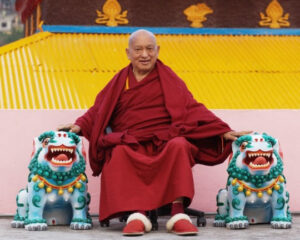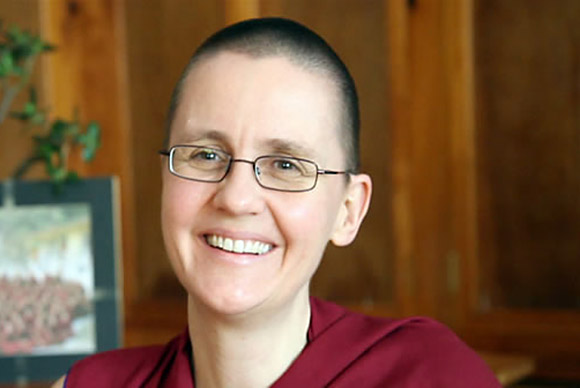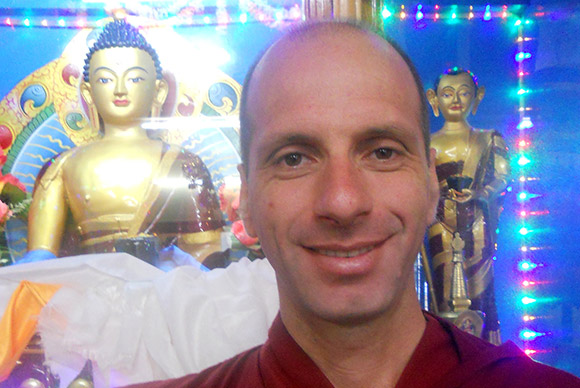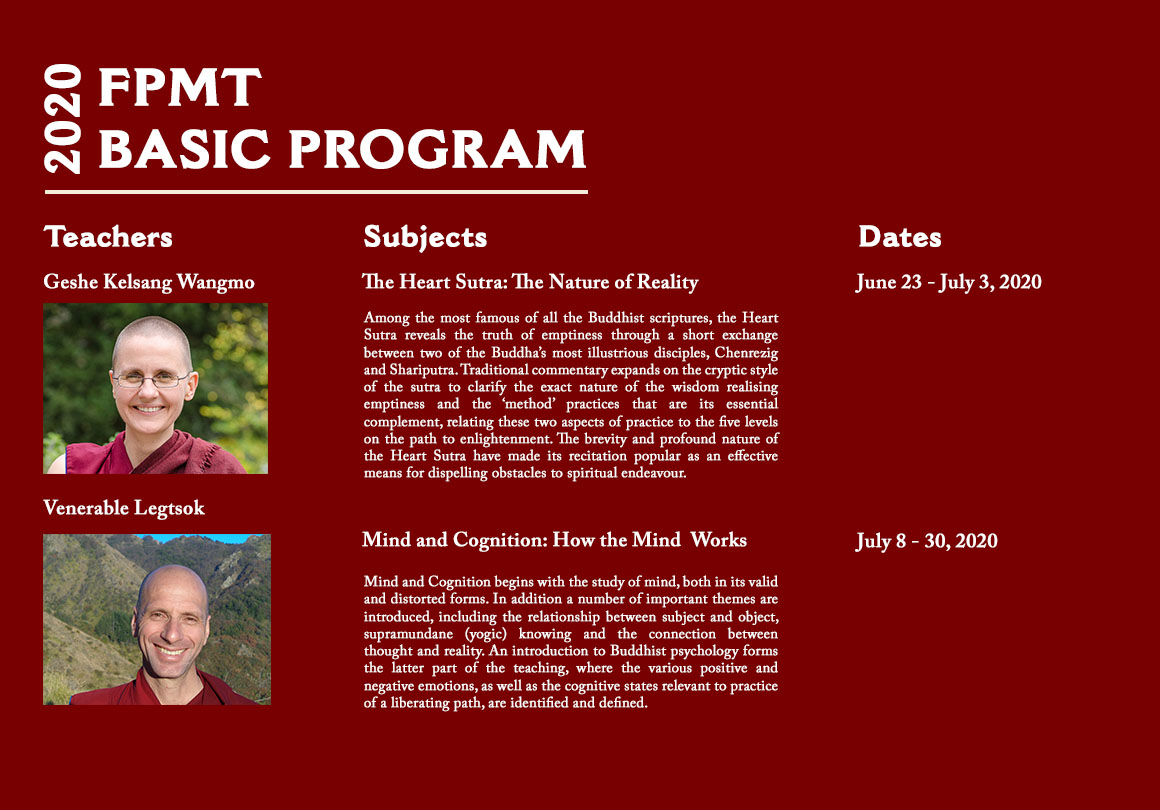
Basic Program
The Basic Program is a five-year course of studies designed by Lama Zopa Rinpoche. It provides a practice-oriented transmission of the Buddhadharma to committed students ready to progress to in-depth study and practice.
Some of Tibetan Buddhism’s most treasured texts form the heart of the Basic Program. Je Tsongkhapa’s Middle Length Lamrim; Shantideva’s Bodhisattvacharyavatara; the Heart Sutra; Jetsun Chokyi Gyaltsen’s Tenets; Maitreya’s Ornament for Clear Realization and Tathagata Essence; the Wheel of Sharp Weapons, and other texts guide the practitioner through a comprehensive study of sutra and tantra.
The program’s comprehensive curriculum greatly enhances students’ Dharma understanding, establishing a sound basis for ongoing study, practice, retreat, and service. It is supported by discussions, meditations, reading and homework assignments and short retreats.
Completing all the Basic Program subjects has many benefits, such as offering a profound overview of the path to enlightenment, grounding your practice in sound knowledge, becoming qualified to offer service in many roles in FPMT education programs worldwide, becoming confident to assist with introductory courses, and eligibility to become an FPMT registered teacher for Discovering Buddhism, which may help your center develop and flourish.
Summer Intensives – A Unique and Special opportunity
At Tushita Meditation Centre we will run the Basic Program as a residential summer program for 5 consecutive years, offering the nine core curriculum subjects.
The subjects are taught by exceptionally qualified Western teachers: Geshe Kelsang Wangmo, first and still only Western female geshe and Venerable Tenzin Legtsok, who has almost finished his studies in the Geshe Program in Sera Monastery, which is one of the great Tibetan Monastic Universities following the Nalanda Tradition in South India.
This has many great advantages:
Both teachers are excellent bridges having their feet in both worlds: brought up and educated in the West they have gone through the comprehensive traditional philosophical studies at Tibetan Buddhist Learning Institutions.
Their extensive teaching experience, supporting teaching sessions with charts, Q&A and meditation, allows them to present complex ideas in a very clear and accessible manner that is suitable for people of all backgrounds.
They will both teach in English, therefore will not need to rely on an interpreter from Tibetan, which is another great advantage, making the program more direct, time efficient and easier to comprehend.
All of this makes it possible to fulfill Tushita’s aspiration to provide for the first time a high quality, time efficient and affordable Basic Program, which will inspire both Indian and international audience to participate and benefit.
Nestled in the forested hills above Dharamsala, Tushita offers a beautiful and conducive retreat atmosphere for intensive studies and meditation. Blessed by countless great practitioners of the past, present and future; Dharamsala is home of His Holiness the Dalai Lama and many other high lamas.
How to participate?
Eligible for this program are those who have previously taken a 10-day Introduction to Buddhism course AND an Intermediate-level course at Tushita, Kopan Monastery or a similar Lamrim course.
Students are encouraged to do the program in five consecutive years or they can choose to take individual subjects.
Upon fulfillment of participation requirements and having passed the test for a subject, the Basic Program Completion Card is signed.
If needed, students can choose to complete their entire Basic Program in several FPMT centers or combine it with the Basic Program Online. You can find a list of the centers that host the Basic Program here. On this page you can also review further info about the Basic Program.
When at least the nine subjects of the core curriculum are completed, students may participate in the review and final exam. Having also engaged in three months of Lamrim retreat as part of the program, the Basic Program Completion Certificate is awarded.
Information about the program

Learning Dharma means less ignorance, more wisdom. It means more light in your life, in your mind, no darkness. That means you have more freedom in your life to achieve liberation from samsara, great enlightenment. The more you understand Dharma means you can educate more, benefit others more, give more light to others, you can cause them to have deeper and clearer understanding of the Dharma. The benefits of preserving Dharma can’t be explained by all the omniscient ones, the Buddhas, even for eons. The more you hear Dharma, it plants more seed of liberation and enlightenment. It makes it so much easier for future lives, easier to achieve liberation and enlightenment. You have a good qualified teacher. Therefore take the opportunity to learn Dharma. Don’t waste your precious human life.
Geshe Kelsang Wangmo
 Geshe Kelsang Wangmo was the first – and until 2016 only – woman to be awarded a Geshe title (only for monastics, it is equivalent to a PhD in Buddhist philosophy).
Geshe Kelsang Wangmo was the first – and until 2016 only – woman to be awarded a Geshe title (only for monastics, it is equivalent to a PhD in Buddhist philosophy).
She was born in Germany and took ordination as a nun in 1991. She later enrolled in the traditional geshe curriculum at the Institute of Buddhist Dialectics (IBD) in Dharamsala (a program 17 years in duration) and was awarded the geshe title in 2011. Since 2004 Geshe Kelsang Wangmo has been teaching Buddhist philosophy classes in English in Dharamsala, following the curriculum of the IBD.
During His Holiness the Dalai Lama’s visit to Hamburg/Germany in 2014, His Holiness announced that Geshe Kelsang Wangmo is the first female Geshe. Up until now she remains the first and only Western woman awarded the geshe degree.
Here are two online interviews with Geshe-la, one in audio and one in text.
Tushita is so very fortunate in being able to count Geshe-la as one of our teachers, as she joins us whenever her very busy schedule allows. She is also our principal translator for senior Tibetan Lamas during special teachings and initiations. Since 2013 Geshe-la has been teaching advanced topics during her annual 2-week residential course in June. The Basic Program is a very special opportunity to study intensively with this amazing teacher!
Venerable Tenzin Legtsok
 Venerable Tenzin Legtsok joined the the Geshe Studies Program at Sera Jey Monastic University in South India in 2004, where he studies classic Indian Buddhist treatises and their Tibetan commentaries in the tradition of ancient Nalanda University. He has been ordained as a Buddhist monk since 2001.
Venerable Tenzin Legtsok joined the the Geshe Studies Program at Sera Jey Monastic University in South India in 2004, where he studies classic Indian Buddhist treatises and their Tibetan commentaries in the tradition of ancient Nalanda University. He has been ordained as a Buddhist monk since 2001.
Born in Virginia, USA in 1973, he obtained a Bachelor of Arts from Kenyon College in 1995. The question, “What makes for the most happy and meaningful life?” which compelled him to major in philosophy during college, gradually led to his study of meditation and philosophy with teachers among the exiled Tibetan communities in India and Nepal from 1999 until the present.
For the past ten years he has made basic Buddhist teachings accessible to various audiences in India and the US through lectures, essays, and meditation instruction.
The nine core curriculum subjects studied in Tushita’s Basic Program are:
– Stages of the Path – the graduated path to enlightenment
– Heart Sutra – the nature of reality
– Mahayana Mind Training – techniques of transformation
– Engaging in the Bodhisattva Deeds – cultivating an altruistic conduct
– Mind and Cognition – how the mind works
– Tenets – Buddhist philosophical systems
– Ornament for Clear Realization – aspects of the omniscient mind and the practices to achieve them
– The Tathagata Essence – the buddha lineage, existing in every sentient being
– Grounds and Paths of Secret Mantra – the four classes of tantra
There is no specific order in which the subjects need to be studied, although there are some recommendations in terms of preparation for relatively difficult subjects.
For a more detailed description of each subject click here. For a list of the Basic Program texts and commentaries click here.
In order to develop a basis for meditation, Buddha taught the importance of listening to the teachings and contemplating them as a way to attain a clear comprehension of the path to enlightenment. According to a Tibetan saying: “The one who meditates without having listened to the teachings is comparable to the one who tries to climb a snow mountain without using their hands”.
Each of these phases, listening, studying and contemplating, and meditating, leads respectively to the wisdom that arises from listening, the wisdom that arises from contemplation and the wisdom that arises from meditation.
To this end the Basic Program was especially designed to offer a balanced approach that combines the academic training and meditation practice which characterize the Gelugpa tradition of Tibetan Buddhism, and to gain practical and immediate benefit from the study and comprehension of the philosophical subjects.
The essential purpose of the Basic Program is to encourage and develop the practice of altruistic transformation of one’s own mind. Because moral discipline is an indispensable part of authentic Dharma practice, Lama Zopa Rinpoche has made a standard of conduct and practice part of the Basic Program: to practice abiding by the five lay-precepts, and to be practicing awareness of positive and negative states in one’s mind and develop the practice of patience and concern for others. Please read here how the Basic Program conduct requirement is further outlined and clarified.
| DAY 1 – CHECK-IN | |
| 1:00pm | Check-in |
| 2:30pm | Welcome and Introduction Talk |
| 3:30 – 4:30pm | Teaching Session |
| 5:00 – 6:00pm | Teaching Session |
| 6pm | Dinner |
| 7:30 – 8:15pm | Evening Practice |
| COURSE DAYS | |
| 6:45 – 7:30 am | Guided Meditation |
| 7:30am | Breakfast |
| 9:00 – 10:00am | Teaching Session |
| 10:00 – 10:30am | Break |
| 10:30 – 11:45am | Teaching Session |
| 11:45am | Lunch |
| 2:00 – 3:00pm | Discussion Group / Study Session |
| 3:00 – 3:30pm | Tea Break |
| 3:30 – 5:00pm | Teaching Session |
| 5:00 – 5:30pm | Break |
| 5:30 – 6:00pm | Guided Meditation |
| 6:00pm | Dinner |
| 7:30 – 8:15pm | Evening Practice |
| LAST DAY – CHECKOUT | |
| 6:45 – 7:30am | Guided Meditation |
| 7:30am | Breakfast |
| 9:00 – 9:45am | What comes next? Talk |
| 10:00 am | Advice for further study/practice and Feedback session |
| 12:00 noon | Picnic Lunch |
| 1:00pm | Check-out |
Please note: all phenomena are impermanent – the exact schedule may vary slightly. Meditation days might be added when suitable.
Rules of Discipline
It is only possible to stay at Tushita if you are taking one of our residential courses/retreats or are an established Buddhist practitioner doing your own formal Buddhist retreat of a minimum of 10 days duration.
Since Tushita is a semi-monastic meditation centre and not a guesthouse, we ask all of our retreatants and visitors to observe the following rules of discipline in order to maintain an atmosphere conducive to inner reflection and meditation:
- Respect all life: do not intentionally kill any living being, even small insects.
- Respect others’ property: do not steal or take anything not freely given.
- Be honest and straightforward: do not lie or intentionally deceive others. This is easy when observing silence!
- Be celibate: no sexual activity. This also includes no holding hands, hugging, massages and other physical displays of affection.
- Be alert and mindful: avoid intoxicants such as alcohol, drugs and cigarettes (we encourage you to stop smoking while here, but if this is impossible, one can smoke at a designated place within the centre boundary).
- Be considerate of others’ silence: keep silence in the appropriate areas and at all times during residential courses, especially in the Gompa and the dormitories. No singing or playing music and in general, maintain a quiet demeanor while on the property.
- Be considerate of the monks and nuns: dress respectfully (please no shorts above the knee, tank-top shirts or tight and revealing clothing).
Basic Course Discipline
In order to keep the atmosphere conducive to inner reflection and spiritual pursuit and to minimise distractions during the course, students on our residential courses and retreats are asked to abide by our basic code of discipline listed below.
- Please settle all outside communication before the course begins. Telling friends and family that you will be out of contact for the duration of the course and sticking by that decision significantly reduces distraction from investigation into the workings of your own mind! Likewise, please settle your travel arrangements etc before you come to Tushita!
- You are expected to observe silence (no talking at all) from the evening of the first day until the end of the course.
- Do not leave Tushita property for the entire course.
- Participants must attend all sessions of the course and come to sessions on time.
- Please put all communication / entertainment devices (laptop / mobile phones /cameras / MP3/CD players) etc into our safe at check-in.
- Please be gentle in your behaviour and sensitive to fellow group members.
Gompa Etiquete
“Gompa” is a Tibetan word which we use for Meditation Hall. Because a Gompa is the location of study, meditation and devotional practices, Buddhists consider them to be holy places. In this tradition, the following modes of behaviour are considered respectful in a Gompa and we ask you to follow them while here:
- Do not point your feet towards the teachers, the altar or any holy object.
- Do not put Dharma materials – prayer books, texts, Dharma books or notebooks with Dharma in them – on the floor, or sit or step over them.
- Do not lie down or do any yoga exercises in the Gompa at any time.
- No idle chit-chat in the Gompa (ie. You can ask the teacher questions during class, but do not talk with other students).
Registration
Pre-requisites to join this advanced course are: having previously taken a 10-day Introduction to Buddhism course AND an Intermediate-level course at Tushita, Kopan Monastery or a similar Lamrim course.
- To register for an advanced course, please read ALL of the above and below information about the course.
- Then complete the online registration form in the Registration Section of this website, individually for each subject of the Basic Program.
- Advanced courses will be confirmed only after a non-refundable / non-transferable (to different course or person) deposit is received from the applicant. See this FAQ for more information.
- If after being confirmed for a course you realize you cannot attend this course, please let us know asap about your cancellation, so we can give your spot to somebody else. In case you Confirm and then don’t show up to the course, you will be considered as a “No Show”. After two “No Shows” you will be prohibited from registering for future courses.
- Check-in time is 1pm on the first day of the course. If you arrive after 2pm, you may lose your place to people on the waiting list.
- Most of our accommodation is dormitory-style and rooms can NOT be booked in advance. We have a very small number of single rooms, and a very high demand for them. Please let us know if you are of a mature age (i.e. over 50) or have a physical condition which would prioritize you for a single room; although we can’t guarantee any particular kind of room, we will do what we can to make you comfortable given our limited resources. See this link for more information about how our room allocation system works. For other queries please visit Frequently Asked Questions.
Fill the form for each subject individually.
Please make sure you have read the information on this page first.


